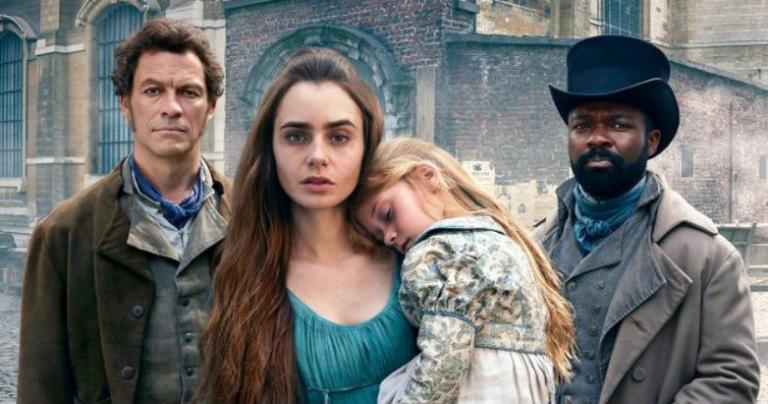
Sing Hallelujah! The BBC’s Les Miserables, premiering Palm Sunday, April 14, on PBS’ Masterpiece, is classy, handsomely mounted, expertly acted, faithfully adapted and true to the spirit of French author Victor Hugo’s beloved novel.
In the expert hands of Welsh-born octogenarian screenwriter Andrew Davies (House of Cards, Pride and Prejudice, Vanity Fair, Daniel Deronda, Doctor Zhivago, Bleak House, Mr. Selfridge, etc.), Les Miserables comes to life over six episodes, airing from April 14 (with two episodes) to May 19, at 9 p.m. ET/PT (check local listings for time and channel in your area).
Dominic West — introduced to American audiences in HBO’s The Wire — stars as Jean Valjean, a convict whose surges of success and reversals of fortune carry him across post-Revolutionary France. Dogging him every step of the way is French policeman Javert, played by David Oyelowo (multicultural casting is employed at will, but not commented upon, and no characters are actually changed).
Also staring are Adeel Akhtar and recent Academy Award-winner Olivia Colman as the malicious Thenardiers; Lily Collins as the hard-luck Fantine; Josh O’Connor as rich-kid-turned-revolutionary Marius; and Erin Kellyman as Eponine.
Anyone who’s seen the musical version of the story, nicknamed Les Mis, or the 2012 movie version of it, is familiar with the broad strokes of the story, but Davies had no interest in revisiting that take on Hugo.
From Deadline.com:
“I absolutely hated the musical!” said Andrew Davies, who wrote the screenplay for PBS/BBC’s six-part adaptation of Victor Hugo’s classic novel Les Miserables, premiering on Masterpiece on April 14.
“I just wanted to rescue this great book,” Davis proclaimed, adding, “I’m sorry, I’d like to be more frank,” when TV critics attending TCA [TV Critics Association Press Tour] seemed stunned by his non-love of the musical.
Interestingly, like Hugo — who was raised in a Catholic atmosphere but apparently never baptized — Davies says he went on a personal journey away from faith.
“It’s all about stuff like redemption,” he said. “I started off my life being brought up in a very religious way, which I don’t have any more, but I do that a kind of yearning for the kind of absolutism that is in this book. It was strangely appealing to me.”
Hugo reportedly ended his life opposed to the Catholic Church, but it’s an irony that, as befits a show making its U.S. premiere on Palm Sunday, Les Miserables is remarkably kind to the Faith.
Derek Jacobi (who played a Crusader turned monk in the 1990s PBS series Cadfael) appears as the generous Bishop Myriel, whose kindness forever changes the trajectory of Jean Valjean’s life. He’s a key figure in the story, but in the book, there’s even more.
Nuns also show up later (with awesome Flying Nun-sized wimples!), but they have strong spines and warm hearts, both for Valjean and his ward, Cosette (Mailow Defoy, as a child; Ellie Bamber, when grown up).
Catholic symbolism and churches run through the whole miniseries. Hugo may not have thought much of how the Church of his day treated the poor, but his bishop character stands as one of the most positive portrayals of a Catholic cleric in literature.
From a post at TheCatholicGeeks.com:
The first character we meet in the book is not Jean Valjean. It’s the Bishop — M. Charles Francois-Bienvenu Myriel. And not only is the Bishop mentioned first, Hugo spends the first fifty pages of the book telling us nothing more than how holy the man is. He’s not just a good bishop; he’s the perfect model of what a Bishop should be.
I have been told that this character isn’t good “because” he’s a bishop; he’s good “in spite of” being a bishop. I find that utterly preposterous. Sure, Hugo might have gotten a few digs in about the Church as an institution, especially about the wealth and political prominence of people like bishops, but think of when and where he lived. That was a real issue then. And, come to think of it, we have our own version of the same issue today. The sex scandal in the Church has wreaked havoc on us far and wide. Does that mean the Church herself is corrupt? Or that all priests are pedophiles? Not at all. Hugo draws attention to the bad parts of this institution, and then illustrates with his story what it should be, what it could be if people were just a little more like this particular Bishop. There’s nothing wrong with that. And it sure as hell doesn’t make Hugo anti-Catholic.
Of all the people he could have chosen to be the man to save the hardened convict, Jean Valjean, he picked an unusually holy man. He could have picked a former revolutionary. Or a politician. Or a teacher. Or an ordinary Citizen of France. But he didn’t. That speaks volumes.
There’s a lot of grime, physical abuse and hard times in Les Miserables, but nothing you can’t show to Grandma or your middle-school and older kids. In fact, I’d love it if you sat down each week with the kids, watched and then talked about the themes of guilt, redemption, mercy and love the story evokes.
I have to watch a lot of dreck, but I’m happy to unreservedly recommend Les Miserables. If you find yourself humming the musical score at some point, just don’t tell Andrew Davies.
Image: PBS
Don’t miss a thing: head over to my other home, as Social Media Manager at Family Theater Productions; and check out FTP’s Faith & Family Media Blog, and our YouTube Channel.














